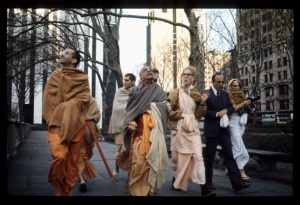SB 11.23.42: Difference between revisions
m (1 revision(s)) |
No edit summary |
||
| Line 1: | Line 1: | ||
{{info | {{info | ||
|speaker= | |speaker=brāhmaṇa from Avanti | ||
|listener= | |listener=brāhmaṇa from Avanti singing to himself | ||
}} | }} | ||
[[Category:Srimad-Bhagavatam - Canto 11 Chapter 23]] | |||
[[Category:Bhagavatam Verses Spoken by the Avanti Brahmana - Vanisource|112342]] | |||
<div style="float:left">'''[[Srimad-Bhagavatam]] - [[SB 11|Eleventh Canto]] - [[SB 11.23: The Song of the Avanti Brahmana|Chapter 23: The Song of the Avantī Brāhmaṇa]]'''</div> | |||
<div style="float:right">[[File:Go-previous.png|link=SB 11.23.41]] '''[[SB 11.23.41]] - [[SB 11.23.43]]''' [[File:Go-next.png|link=SB 11.23.43]]</div> | |||
{{RandomImage}} | |||
{{SBnotice}} | |||
==== TEXT 42 ==== | ==== TEXT 42 ==== | ||
<div | <div class="verse"> | ||
dvija uvāca | :dvija uvāca | ||
nāyaṁ jano me sukha-duḥkha-hetur | :nāyaṁ jano me sukha-duḥkha-hetur | ||
na devatātmā graha-karma-kālāḥ | :na devatātmā graha-karma-kālāḥ | ||
manaḥ paraṁ kāraṇam āmananti | :manaḥ paraṁ kāraṇam āmananti | ||
saṁsāra-cakraṁ parivartayed yat | :saṁsāra-cakraṁ parivartayed yat | ||
</div> | </div> | ||
| Line 18: | Line 23: | ||
==== SYNONYMS ==== | ==== SYNONYMS ==== | ||
<div | <div class="synonyms"> | ||
dvijaḥ uvāca—the brāhmaṇa said; na—not; ayam—these; janaḥ—people; me—my; sukha—of happiness; duḥkha—and distress; hetuḥ—the cause; na—nor; devatā—the demigods; ātmā—my own body; graha—the controlling planets; karma—my past work; kālāḥ—or time; manaḥ—the mind; param—rather only; kāraṇaṁ—the cause; āmananti—is called by standard authorities; saṁsāra—of material life; cakram—the cycle; parivartayet—causes to rotate; yat—which. | dvijaḥ uvāca—the ''brāhmaṇa'' said; na—not; ayam—these; janaḥ—people; me—my; sukha—of happiness; duḥkha—and distress; hetuḥ—the cause; na—nor; devatā—the demigods; ātmā—my own body; graha—the controlling planets; karma—my past work; kālāḥ—or time; manaḥ—the mind; param—rather only; kāraṇaṁ—the cause; āmananti—is called by standard authorities; saṁsāra—of material life; cakram—the cycle; parivartayet—causes to rotate; yat—which. | ||
</div> | </div> | ||
{{SBcollapse}} | |||
==== TRANSLATION ==== | ==== TRANSLATION ==== | ||
<div | <div class="translation"> | ||
The brāhmaṇa said: These people are not the cause of my happiness and distress. Neither are the demigods, my own body, the planets, my past work, or time. Rather, it is the mind alone that causes happiness and distress and perpetuates the rotation of material life. | The brāhmaṇa said: These people are not the cause of my happiness and distress. Neither are the demigods, my own body, the planets, my past work, or time. Rather, it is the mind alone that causes happiness and distress and perpetuates the rotation of material life. | ||
</div> | </div> | ||
__NOTOC__ | </div> | ||
</div> | |||
<div style="float:right">[[File:Go-previous.png|link=SB 11.23.41]] '''[[SB 11.23.41]] - [[SB 11.23.43]]''' [[File:Go-next.png|link=SB 11.23.43]]</div> | |||
__NOTOC__ | |||
__NOEDITSECTION__ | |||
Revision as of 13:23, 3 July 2021

A.C. Bhaktivedanta Swami Prabhupada
Please note: The synonyms, translation and purport of this verse were composed by disciples of Śrīla Prabhupāda
TEXT 42
- dvija uvāca
- nāyaṁ jano me sukha-duḥkha-hetur
- na devatātmā graha-karma-kālāḥ
- manaḥ paraṁ kāraṇam āmananti
- saṁsāra-cakraṁ parivartayed yat
SYNONYMS
dvijaḥ uvāca—the brāhmaṇa said; na—not; ayam—these; janaḥ—people; me—my; sukha—of happiness; duḥkha—and distress; hetuḥ—the cause; na—nor; devatā—the demigods; ātmā—my own body; graha—the controlling planets; karma—my past work; kālāḥ—or time; manaḥ—the mind; param—rather only; kāraṇaṁ—the cause; āmananti—is called by standard authorities; saṁsāra—of material life; cakram—the cycle; parivartayet—causes to rotate; yat—which.
Translation and purport composed by disciples of Śrīla Prabhupāda
TRANSLATION
The brāhmaṇa said: These people are not the cause of my happiness and distress. Neither are the demigods, my own body, the planets, my past work, or time. Rather, it is the mind alone that causes happiness and distress and perpetuates the rotation of material life.